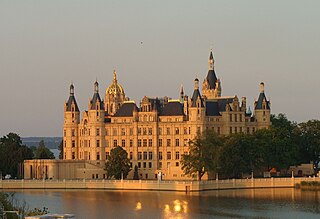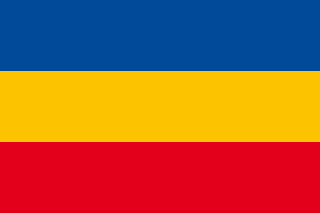
Mecklenburg-Vorpommern, also known by its anglicized name Mecklenburg–Western Pomerania, is a state in the north-east of Germany. Of the country's sixteen states, Mecklenburg-Vorpommern ranks 14th in population; it covers an area of 23,300 km2 (9,000 sq mi), making it the sixth largest German state in area; and it is 16th in population density. Schwerin is the state capital and Rostock is the largest city. Other major cities include Neubrandenburg, Stralsund, Greifswald, Wismar, and Güstrow. It was named after the two regions of Mecklenburg and Fore Pomerania.

Schwerin is the capital and second-largest city of the northeastern German state of Mecklenburg-Vorpommern as well as of the region of Mecklenburg, after Rostock. It has around 96,000 inhabitants, and is thus the least populous of all German state capitals.

Neubrandenburg is a city in the southeast of Mecklenburg-Vorpommern, Germany. It is located on the shore of a lake called Tollensesee and forms the urban centre of the Mecklenburg Lakeland.

Müritz is a former Kreis (district) in the southern part of Mecklenburg-Vorpommern, Germany. It is named after the lake Müritz. Neighboring districts were Parchim, Güstrow, Demmin, Mecklenburg-Strelitz, the district-free city Neubrandenburg and the district Ostprignitz-Ruppin in Brandenburg. The district was disbanded at the district reform of September 2011. Its territory has been part of the Mecklenburgische Seenplatte district since.

Burg Stargard is a small town in the Mecklenburgische Seenplatte district, in Mecklenburg-Vorpommern, Germany. It is situated 8 kilometres (5.0 mi) southeast of Neubrandenburg.

The Mecklenburg Lake Plateau or Mecklenburg Lakeland is the largest coherent lake and canal region in Germany and is sometimes called "the land of a thousand lakes". There are several nature parks and well-known lakes with unique flora and fauna in the region, such as the Müritz, the biggest German lake lying entirely within Germany, the Plauer See, the Fleesensee, the Tollensesee, the Schmaler Luzin and the Kölpinsee.

The Müritzeum is a visitor centre and nature discovery centre for the Müritz National Park, located on Lake Müritz, near the town of Waren in the north German state of Mecklenburg-Vorpommern.

Luckow is a municipality in the Vorpommern-Greifswald district, in Mecklenburg-Vorpommern, Germany. The municipality is administered by the office Am Stettiner Haff with seat in Eggesin.

Jatznick is a municipality in the Vorpommern-Greifswald district, in Mecklenburg-Vorpommern in north-eastern Germany.

The Verbandsliga Mecklenburg-Vorpommern is the sixth tier of the German football league system and the highest league in the German state of Mecklenburg-Western Pomerania. Until the introduction of the 3. Liga in 2008 it was the fifth tier of the league system, until the introduction of the Regionalligas in 1994 the fourth tier.

The Uckermark is a historical region in northeastern Germany, which currently straddles the Uckermark District of Brandenburg and the Vorpommern-Greifswald District of Mecklenburg-Vorpommern. Its traditional capital is Prenzlau.

Franz Christian Boll was a Lutheran theologian and historian. He was the father of physiologist Franz Christian Boll (1849–1879), and the brother of naturalist Ernst Boll (1817–1868), with whom he collaborated throughout his career.

Ernst Friedrich August Boll was a German naturalist and historian. He was a brother to historian Franz Boll (1805–1875), with whom he worked on numerous projects. Ernst Boll is remembered for his extensive research involving the natural history of Mecklenburg.
Mecklenburgische Seenplatte is a district in the southeast of Mecklenburg-Vorpommern, Germany. It is bounded by the districts Ludwigslust-Parchim, Rostock (district), Vorpommern-Rügen, Vorpommern-Greifswald, and the state Brandenburg to the south. The district covers the largest area of all German districts and more than doubles the area of the state Saarland. The district seat is the town Neubrandenburg.

The Region of Stralsund belonged to the Prussian Province of Pomerania and existed from 1818 to 1932.

The Spyker Castle and estate lie on the territory of the municipality of Glowe in the district of Vorpommern-Rügen in the German state of Mecklenburg-Vorpommern. Spycker Castle is the oldest profane structure on the Baltic Sea island of Rügen.

Stargard Castle is the northernmost extant hill castle in Germany. The 13th century castle, standing on a 90 m hill, and the eponymous small town in the valley below lie several kilometers southeast of Neubrandenburg, in the northeastern German state of Mecklenburg-Vorpommern. The complex consists of an outer and an inner bailey with eleven buildings preserved. The imposing castle keep serves as the city's landmark.

The State of Mecklenburg was a subdivision of the Soviet occupation zone and one of the states of East Germany which corresponds widely to the present-day German state Mecklenburg-Vorpommern. The state was originally formed as an administrative division, the State of Mecklenburg-Vorpommern, by the Soviet Military Administration in Germany (SMAD) in July 1945. It consisted of the 1934-established Mecklenburg and parts of the former Prussian provinces of Pommern and Hanover. The city of Swinemünde was handed over to Poland in October 1945, becoming part of Szczecin Voivodeship. In November 1945, a transfer of small territories along the Inner German border to the former Province of Schleswig-Holstein was carried out as part of the Barber–Lyashchenko Agreement. About 2.1 million people were estimated to live in Mecklenburg in 1946. From 1947, the term Vorpommern was excluded from the official name as the SMAD feared that this would support revisionist actions against formerly German parts of Poland. Compared to the administrative divisions of Nazi Germany, Mecklenburg comprised the Gaue Mecklenburg and parts of Pomerania and Eastern Hanover.

Remplin Palace is located in the village of Remplin, part of the municipality of Malchin in Mecklenburg-Vorpommern, Germany. The palace was one of the residences of the Grand Ducal family of Mecklenburg-Strelitz until it was destroyed by fire in 1940. Only the northern wing of the complex is remaining.
Hans-Joachim Griephan is a German journalist, publisher and founder of the "Wirtschaftsinformationsdienst" published since 1964, the Griephan Briefe.




















